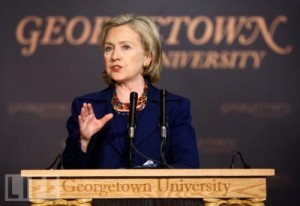Hillary would charge new fees for fossil fuel extraction
 During her official launch speech last weekend, Democratic presidential candidate Hillary Clinton tossed out a big clue about the direction she would take the country’s climate change policy. If elected, she vowed, she would seek to make the United States a “clean energy superpower” and pay for the transition in part with “additional fees and royalties from fossil fuel extraction.”
During her official launch speech last weekend, Democratic presidential candidate Hillary Clinton tossed out a big clue about the direction she would take the country’s climate change policy. If elected, she vowed, she would seek to make the United States a “clean energy superpower” and pay for the transition in part with “additional fees and royalties from fossil fuel extraction.”Coming just days before Pope Francis’s leaked appeal to address climate change grabbed headlines around the globe, Clinton’s comments made little splash in the media. But that brief mention of new fees potentially has big implications, especially in the West, where most federal coal, oil and gas resources are located. Environmental groups quickly called her staff to try to glean details. So far there aren’t any. But that phrase was the biggest hint so far that Clinton would pursue an untapped vein of climate politics.
To date, U.S. climate policies have focused on reducing the greenhouse gas emissions that come from burning fossil fuels: the carbon dioxide that comes from tailpipes or power plant smoke stacks. At the same time, U.S. politicians have avoided policies that would make it more expensive to get fossil fuels out of the earth, an issue that is controversial because of the geopolitical downsides of imported oil.
Clinton has yet to provide details of the policy she envisions. “We have not rolled out huge specifics on this,” Amanda Renteria, Clinton’s political director, said. Still, the general principle is clear. When companies mine coal or drill for oil or gas on federal land, they pay royalties to the federal government. And while these fees give taxpayers a return on public resources, they don’t reflect the enormous costs that the United States already pays due to the impacts of climate change — such as sea level rise, crop loss, air pollution and extreme heat and flooding. Clinton is talking about adding in fees to offset those costs and to potentially spur more renewable energy development and energy efficiency. Environmental groups hope that these fees will be high enough to keep some of the coal and hydrocarbons in the ground.
In her address, to several thousand supporters on New York’s Roosevelt Island, Clinton acknowledged that many communities still rely on fossil fuel industries for jobs and tax dollars. But she said her administration would “ease the transition for distressed communities to a more diverse and sustainable economic future, from coal country to Indian country, from small towns in the Mississippi Delta to the Rio Grande Valley to our inner cities.”
But industry representatives said it would be difficult for Hillary to square new fees for fossil fuel extraction with the main message of her campaign: support for workers. “These are precisely the workers who’ll be hurt most by the contraction in the manufacturing and energy economy caused by taxing fossil energy,” Luke Popovich, a spokesman for the National Mining Association, said.
Clinton also appears willing to use climate change to differentiate herself from Republican rivals. “Ask many of these candidates about climate change, one of the defining threats of our time, and they’ll say: ‘I’m not a scientist,’” Clinton said. “Well, then, why don’t they start listening to those who are?”
In fact, Republican presidential hopefuls vary a great deal when it comes to climate change. Some — Texas Sen. Ted Cruz, Kentucky Sen. Rand Paul and former Pennsylvania Sen. Rick Santorum — express skepticism that global warming is real. Others — Floridians Jeb Bush and Marco Rubio, and New Jersey Gov. Chris Christie — dispute how much people cause the problem. Still others — former New York Gov. George Pataki and South Carolina Sen. Lindsey Graham — acknowledge people’s role and vow to address it in a GOP way.
Clinton’s nod to climate change in her first big address points to the issue’s likely prominence in the race to come.
“I think there’s no way this issues doesn’t pop,” Heather Taylor, director of Natural Resources Defense Council’s Action Fund, the group’s political arm, said.
That could give Clinton an advantage. As HCN reported in May, Clinton’s campaign chairman, John Podesta, is a leader in climate policy and wants the issue to figure big in the campaign. Podesta told HCN last week that as it is now, taxpayers subsidize federal coal twice: Once in the low royalties companies pay and again through taxpayer-funded repairs of damage associated with climate change. When asked about a policy aimed at increasing the price of federal fossil fuels to keep some of them in the ground, Podesta said: “I think it’s pretty close to ripe.”
You can return to the main Market News page, or press the Back button on your browser.

